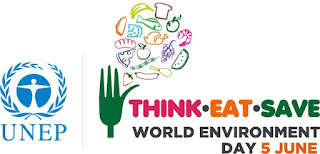“Although individual decisions may seem small in the face of global threats and trends, when billions of people join forces in common purpose, we can make a tremendous difference.”
UN Secretary-General Ban Ki-Moon
UN Secretary-General Ban Ki-Moon
World Environment Day is an annual event on 5 June that is aimed at being the biggest and most widely celebrated global day for positive environmental action.
World Environment Day is one of the principal vehicles through which the United Nations Environment Programme (UNEP) stimulates worldwide awareness of the environment and focuses political attention and action.
World Environment Day activities are involving everyone from everywhere.
World Environment Day is also a day for people from all walks of life to come together to ensure a cleaner, greener and brighter outlook for themselves and future generations.
Theme 2019:
The theme for this year’s World Environment Day celebrations is Think.Eat.Save.
Think.Eat.Save is an anti-food waste and food loss campaign that encourages you to reduce your footprint. According to the UN Food and Agriculture Organization (FAO), every year 1.3 billion tonnes of food is wasted.
The theme for this year’s World Environment Day celebrations is Think.Eat.Save.
Think.Eat.Save is an anti-food waste and food loss campaign that encourages you to reduce your footprint. According to the UN Food and Agriculture Organization (FAO), every year 1.3 billion tonnes of food is wasted.
This is equivalent to the same amount produced in the whole of sub-Saharan Africa. At the same time, 1 in every 7 people in the world go to bed hungry and more than 20,000 children under the age of 5 die daily from hunger.
Each year, Clean Up the World Members participate in a range of activities to celebrate World Environment Day.
Education:
World Environment Day (WED) is also a day for people from all walks of life to come together to ensure a cleaner, greener and brighter outlook for themselves and future generations.
Here we are writing about Civics and Environmental education at schools. So important to help our your students became engaged citizens.
Yes! Because World Environmental Day is not about a day! WED is about every day! Schools have an important role.
Educators must teach environmental values in different moments of their lessons, providing some thoughts and digital educational resources, educate young people for a sustainable future and inspiring them being a good example.
Of course you can't forget to invite your students to use their devices (iPad, smartphone, tablet) for developing interactive activities.
Educators must teach environmental values in different moments of their lessons, providing some thoughts and digital educational resources, educate young people for a sustainable future and inspiring them being a good example.
Of course you can't forget to invite your students to use their devices (iPad, smartphone, tablet) for developing interactive activities.
Students will evolve in creative green projects that they will share with colleagues, families, friends and pen-pals. They will become good young ecologists.
Level: All levels (adapt to the level everyone is teaching).
Curricula: Cross-curricular: Languages, Sciences; Arts (Design, Photograph, Multimedia).
Some Activities for students:
- Make a video with your class: invite students to write the script (Languages curriculum and Multimedia);
- Start a slogan contest on Twitter. Every student will write a slogan and publish it on Twitter on the hashtag #WED2013;
The best 5 slogans of every class will have a prize (ask for help to a librarian or tech store);
- Plan and create a page on Facebook (school or class account) and invite other students from the school to interact with on thematic subjects, videos, songs, famous environmentalists);
- Invite students to write stories, poems, interviews, drama, letters to pen-pals about environment and publish them on a green class blog;
- Make some photos (outdoor class) and publish them on a green class blog;
- Organize a school clean-up or neighborhood school clean-up;
- Start a campaign to stop using plastic bags at school, home, and ask the community to do the same;
- Stop food waste at school canteen, home, markets.
Whatever you do, tell UNEP about it! All your activities will be posted on the website.
Registration here
For years, I shared my green ideas with my students. Today, I know they are young citizens who care about environment. And some of the oldest are now involved in volunteering in different NGOs.
"It would be absolutely useless for any of us to work to save wildlife without working to educate the next generation of conservationists."
Jane Goodall, primatologist, anthropologist
Really agree!
So think before you eat and help save our environment!
G-Souto
03.06.2013
Copyright © 2013G-Souto'sBlog, gsouto-digitalteacher.blogspot.com®
World Environmental Day in School Education by G-Souto is licensed under a Creative Commons Attribution-NonCommercial-NoDerivatives 4.0 International





No comments:
Post a Comment